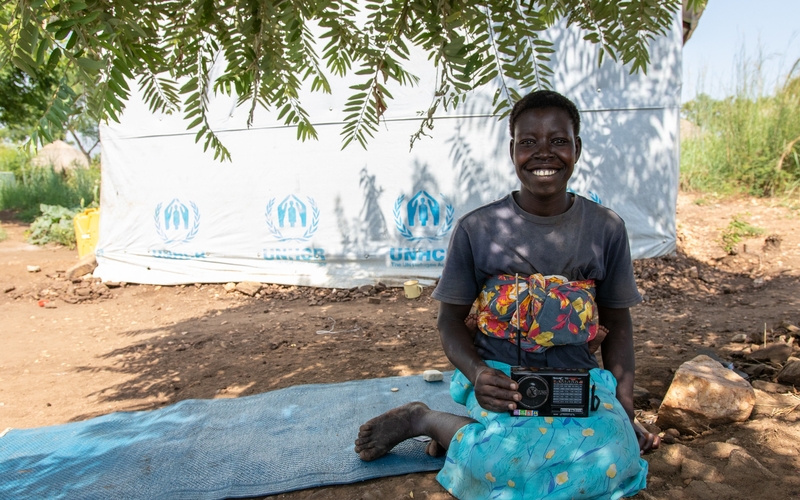A community radio station in Uganda helps refugees help themselves.
In northern Uganda, where more than a million South Sudanese have crossed the border to escape the brutal armed conflict in their country, it is hard to overestimate the power of community radio. Refugees living in camps (known here as settlements) yearn for contact with the outside world—with their families back home, with other refugees, with supporters and agencies that fund humanitarian programs, and with the authorities that govern their fate.
So when Ayikobua Noel from Radio Pacis makes a visit to Omugo settlement, residents give him a warm welcome. Noel hosts two weekly shows for and about refugees: “Voice of the Voiceless” is recorded in the settlements and gives refugees a chance to speak out about a host of issues; “Refugee Hour” takes place in the studio, where he invites guests for a deeper dive into a topic of concern to the refugees.
“It’s my favorite radio station,” says Moses Lomude, who lives in Omugo. “I like the refugee program so much. The people who speak are the voice for those of us who can’t. They describe our suffering. They speak for me.”
And people are listening who can address that suffering.
“The refugee radio shows give us a chance to listen to the people and hear the views of the community,” says Amulen Mary, a staffer in the local Office of the Prime Minister.
The residents themselves tune in for all kinds of reasons.
“The radio show is very important, because it helps the refugees learn from one another,” says Aloro Fred. “Refugee farmers can learn from other refugee farmers how to share land with host communities and how to grow crops here. They learn what is possible.”
“These shows are helping educate youth,” says youth leader Taban Peter. “The community is learning how to prevent addiction and how to coexist peacefully with our hosts.”
Sports—soccer/football in particular—take on special importance in a setting like this, as much-needed entertainment for people whose lives have been upended by war, and also as a way to ease tensions among groups that might otherwise come into conflict. “People learn about our football games on the radio,” says Peter. “They learn where they will be, and what the scores are. People join teams because they hear about them on the radio.”
Noel has his eye on other results.
“People learned on the show about the situation for youth,” he says. “Most were idle after primary school. They had nowhere to go. They were getting involved in criminal activity, like theft of solar panels that were needed for our water pumps. We believe construction of two new secondary schools was the direct result of what people said on the radio shows. Now youth are kept busy with school—and there is less theft.”
Further, he says, many of the women who have participated in the radio show are now recognized as leaders—by themselves and others.“They realized they were able to speak out and it gave them confidence. Since then they have been recruited as representatives by international agencies and their own communities.”

Strengthening local organizations
Oxfam and our local partner CEFORD have been supporting the radio shows, but not by simply handing them a check to cover costs. Our goal in Uganda and beyond is to help important local organizations engaged with an emergency to become stronger, more effective, and more sustainable. So, through an initiative known as ELNHA (Empowering Local and National Humanitarian Actors), we have offered trainings in humanitarian response, financial systems, advocacy, strategic planning, and proposal-writing. One of the Radio Pacis journalists had a chance to spend time in a drought-affected region of the country, to deepen his understanding of humanitarian emergencies and response.
As program manager, Noel’s work is never done. He rolls into the office at 7:00 in the morning and doesn’t leave before midnight. If he’s awake, in other words, he’s working. He’s in trouble with his mother for missing so many family events, but clearly the apple hasn’t fallen far from the tree. “My mother was an inspiration to me,” he says. “She struggled a lot. She was a single mother who raised four children, but she was also very welcoming. When she saw someone struggling, she tried to help, so she raised the children of relatives, as well. Every time I see her, I see a hero.”
But grueling as the hours are, he loves his job. Asked what feels most satisfying about his work, he thinks a moment and then answers “everything.”
There’s no question but that he’s making a difference. Not just in improving the material conditions of life in the camp, but also by lifting the spirits of people suffering from the effects of violence, displacement, and the loss of loved ones. For now, they can’t be reunited with their friends and families, but some hold out a special hope: “With the radio show,” says a community leader, “our voices might reach back home.”
